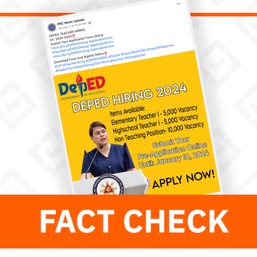SUMMARY
This is AI generated summarization, which may have errors. For context, always refer to the full article.
![[OPINION] Academic dishonesty is pervasive](https://www.rappler.com/tachyon/2024/05/tl-academe-dishonesty.jpg)
There’s no other way to put it. It’s a tragedy.
Dishonesty in the academe is the highest form of scholarly treason. No reason can make it justifiable.
The academe thrives out of public trust. One can, of course, say the same thing about any institution, whether it’s religion or the business sector.
The academe, however, occupies a privileged place, if only because it fulfills two big roles: (a) equipping young people with competencies for life after college and (b) discovering new ideas that could, one way or another, make a difference in society.
Both roles demand an unwavering commitment to honesty.
Note that I say “honesty” – and not “facts” – out of intellectual humility. Professors are not infallible, but what they say in the classroom carries weight. Students are not perfect, but their work must be rigorous. Whether it’s the laboratory, the classroom, or the library, academic space demands honesty.
Philippine context
In the Philippines, the academe, alongside the church, enjoys the highest trust ratings, hovering over 90% according to the latest iteration of the Philippine Trust Index. That, no doubt, is a good thing.
This, however, is not to deny the reality of academic dishonesty. It’s “the enemy within our gates,” as one book puts it. And according to Michael Moffatt, “cheating [on college campuses] comes almost as naturally as breathing.” The anthropologist even describes cheating as an “academic skill almost as important as reading, writing, and math.”
Moffat might be describing the US context, but this could very well be the case in the Philippines.
Based on a survey administered by Mark Quintos, 90% of his survey respondents across different disciplines had cheated. Most of the time, the cheating came in the form of sharing answers with others who were about to take their exam. In recent years, many students have also turned to service providers to write their theses. Mark Gabrial Wagan Aguilar’s study reveals that this has become an industry, with service providers earning between PhP 1,500.00 and PhP 20,000.00 weekly.
Professors are just as liable.
This week, a professor at a university in Mindanao made a (very) public apology for claiming as her own the publication of her former thesis advisee. While many of her loyal students came to her defense, many others also took the opportunity to share their own experiences. “Some teachers cannot come up with original research so they use students’ output for themselves,” wrote one.
Personal matter
Academic dishonesty, to be honest, is also a personal matter to me. I’ve been an academic for over a decade, and in that period, I’ve seen academic dishonesty on many levels.
When I was starting out, I didn’t realize that a student had been plagiarizing the various drafts of her thesis all along. I found out only when one of her classmates discovered it during the peer review process. One of my innovations at that time was to get students to read each other’s drafts to get a sense of which writing styles worked best. (I admit that I should’ve known better. I simply trusted all of my students to do the right thing. A case was filed with our university’s discipline committee, and the student was sanctioned.)
In the course of my career, I also encountered cases of plagiarism involving my own colleagues. The problem with plagiarism at a professional level is that it can be a repetitive behavior. Unless one is caught, it can be a rewarding practice. Hiring and promotion in the academe, after all, are tied to one’s publications.
Plagiarism and the fifty shades of intellectual theft are all, of course, tied to power relations, as one could readily see in the case of the professor I mentioned above and her former advisee. At a conference some years ago, a highly respected anthropologist told me that when she was a graduate student, a senior scholar used her ideas without even citing her work. Unfortunately for her, that senior scholar peddled these ideas as his own for many, many years.
This is why graduate scholars ought to be careful. Just recently, a PhD student asked me for advice on whether he should share the draft of his manuscript with another senior scholar who saw his presentation at a conference. He told me that he didn’t feel good about it because their topics overlapped.
Since the professor gave him no convincing reason, I helped him draft a polite response. You see, this PhD student still wanted to be as respectful as possible since that professor might end up reviewing his dissertation or manuscripts later on. (In the academe, some people can be really nasty.)
This problem, however, is not unique to young scholars. Intellectual theft is all too real among professors too. I saw this for myself when I was the head of my university’s research office.
A colleague sought the help of our office to take to task one of the leading journals in his field, to which he submitted a manuscript. The review process had been taking an unnecessarily long time and to his surprise, his ideas landed in another publication, authored by the very editor assigned to handle his submission. My office prepared a strong letter addressed to that journal’s editorial board. We also filed a formal complaint with Scopus, a leading database with which that journal was indexed.
Both Scopus and the journal promised to investigate.
Publish or perish
All this is to say that academic dishonesty is not an aberration in the academe. It is pervasive even if we might wish to deny it.
The problem, however, is not going away anytime soon. Because of power asymmetry, academic institutions must have mechanisms in place to report such abuses and protect whistleblowers. If we’re truly serious about student plagiarism, we should be more concerned about dishonesty among fellow professors.
It should also be said that the “publish or perish” mentality will only make things worse.
Philippine higher education may not admit it, but it seems to be embracing this mindset more and more. Hiring and promotion are tied to one’s “research productivity.” Moreover, the Commission on Higher Education has a new policy that mandates graduate students to publish peer-reviewed articles before getting their degrees.
But as my colleague, Dean Jomar Rabajante of UPLB’s Graduate School, puts it, the policy is not only restrictive for graduate students. It will foster predatory publishing and possibly more cases of plagiarism, if not substandard scholarship.
This “publish or perish” mentality is evidently tied to the national fetish for global university rankings. That is another topic altogether.
But what concerns me is that this push for “more publications” sidetracks an unbelievably basic issue. Many universities in the Philippines do not have the resources and capacity to support their professors, researchers, and students. Case in point: ill-equipped libraries. (Last year, I wrote a piece for Rappler on the state of research in the Philippines.)
There’s no doubt that academic dishonesty is a matter of choice. In her public apology, that professor acknowledged her fault; from the looks of it, her department has already sanctioned her. However, it should also be clear to the academe that this is not an isolated case.
Academic dishonesty exists across all levels of higher education. There’s no doubt that the public trust we enjoy as a sector is worth celebrating.
But we must also acknowledge that it is fragile. The last thing we want is for our own students to turn their backs on us. – Rappler.com
Jayeel Cornelio, PhD is Visiting Professor at the Center for Asian Democracy at the University of Louisville. He is on sabbatical from the Ateneo de Manila University, where he is Professor of Development Studies. Follow him on X @jayeel_cornelio.
Add a comment
How does this make you feel?


![[OPINION] Moving beyond blaming teachers: The call for regulatory deregulation](https://www.rappler.com/tachyon/2024/02/Moving-Beyond-Blaming-Teachers-The-Call-for-Regulatory-Deregulation.jpg?resize=257%2C257&crop=262px%2C0px%2C720px%2C720px)

There are no comments yet. Add your comment to start the conversation.